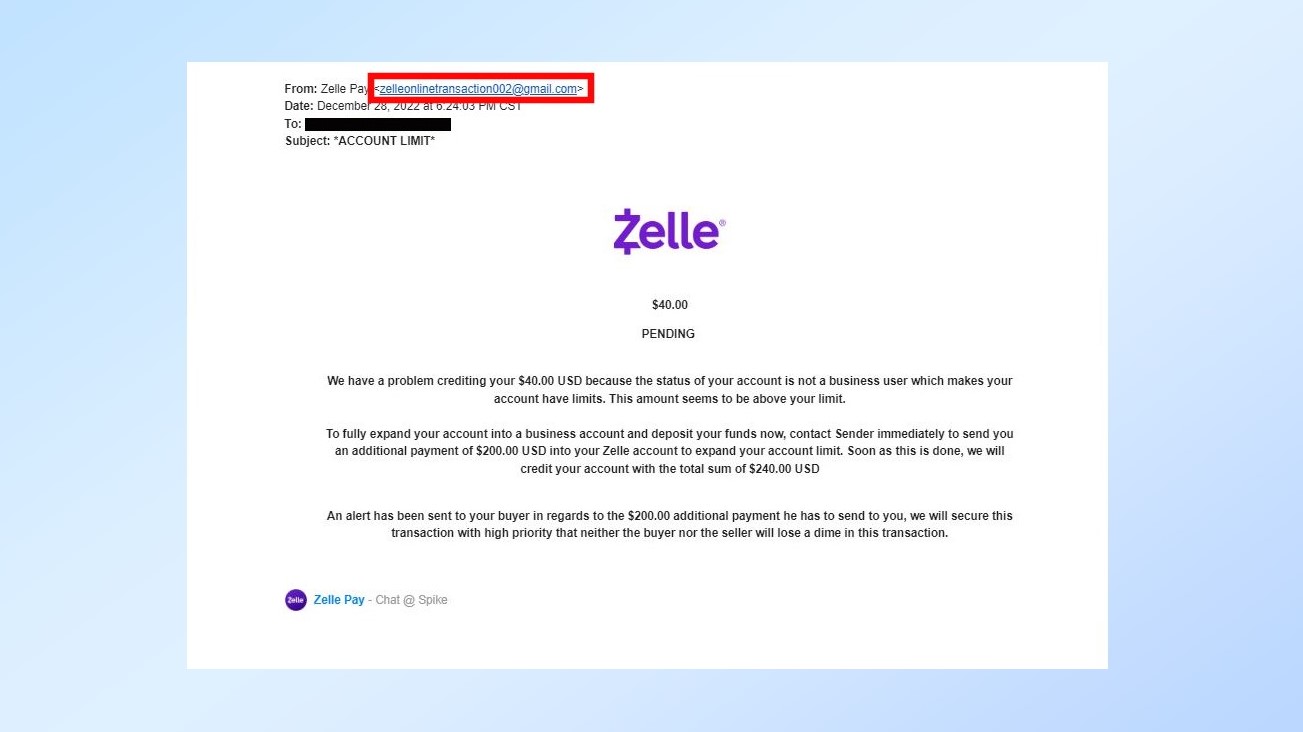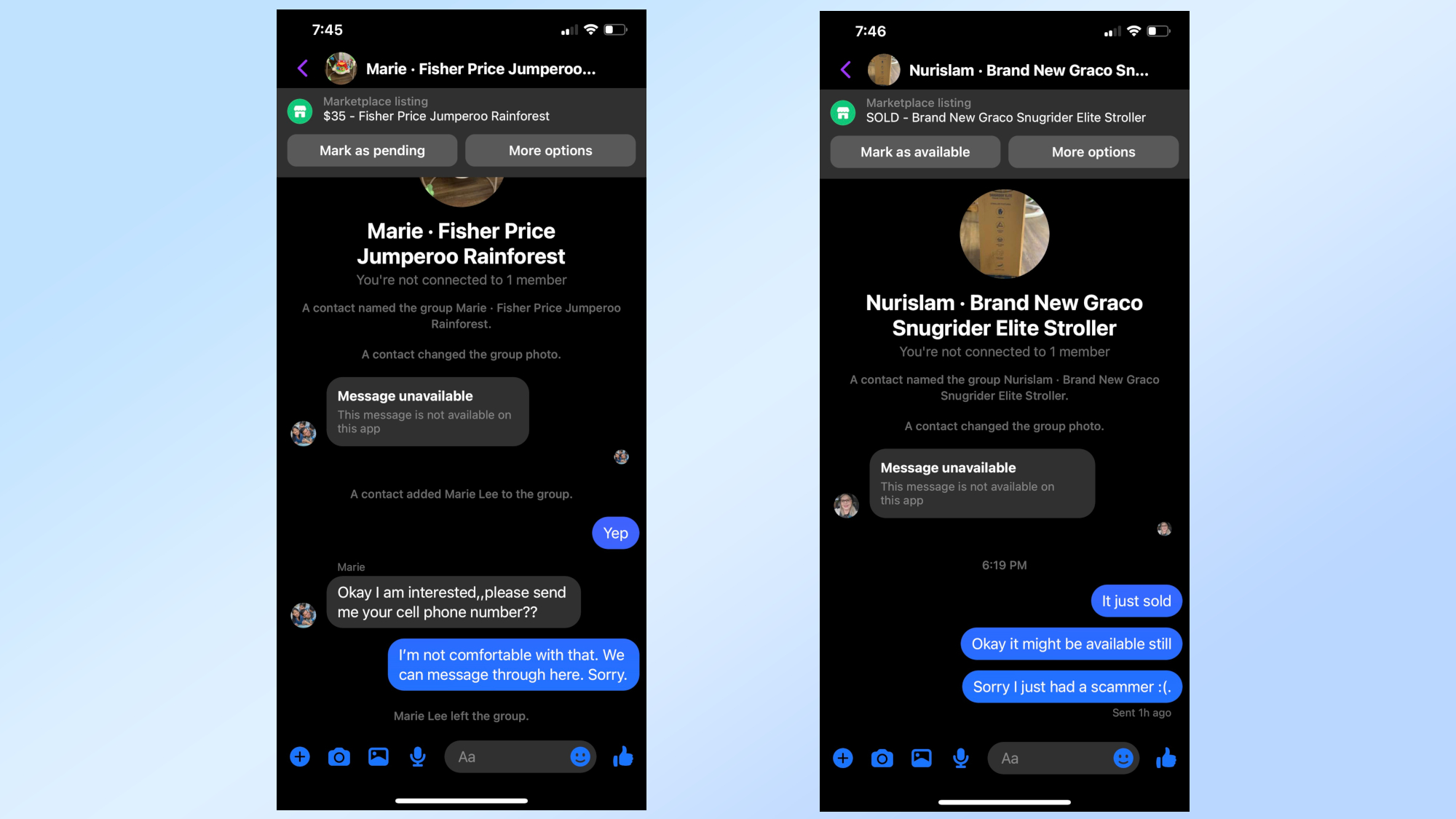My wife almost fell for this Facebook Zelle scam — watch out
Selling items on Facebook Marketplace? Watch out for this scam

I frequently write about all the ways scammers are trying to trick you on social media. So imagine my surprise when my wife almost fell victim to an online scam over the holidays.
As our son is getting older and outgrowing some of his baby toys, my wife thought it would be a good idea to try and sell some of them online to make room for his new presents from Santa. While she’s well aware of phishing emails and how to spot them, she didn’t expect to be scammed when trying to sell a few items on Facebook Marketplace.
Although we typically expect to encounter scams when buying new products, you can also be scammed when trying to sell your old ones on Facebook Marketplace, Craigslist or other online platforms.
Zelle scams on Facebook Marketplace
According to a recent study from BeenVerified, scams on Facebook Marketplace have increased by 184.8% in the past year. Likewise, Zelle scams have seen an 86% increase during that same time period.
The scam my wife encountered leveraged the size of Facebook Marketplace to try and trick her and other sellers into responding to phishing emails impersonating Zelle. This isn’t the first time we’ve seen Zelle scams in the wild, though previous scams have involved users receiving a text message warning about a “fraud alert” on a pending payment made through the mobile banking app.
In my wife’s case though, a buyer quickly responded to her listing about one of my son’s baby toys on Facebook Marketplace. They explained that they really wanted the item and asked if they could pay for it using Zelle. As Zelle has become increasingly popular due to the fact that it’s used by many U.S. banks including Chase, Bank of America, Citi, TD Bank and others, she agreed, as she was in a hurry to sell the old toys before Christmas.
The scammer capitalized on this and tried to invoke a sense of urgency by repeatedly asking her if she had received the payment yet. She told the scammer she hadn’t received the payment to which they insisted she check her spam folder, a major red flag. Why would an email from a reputable payment service end up in your spam folder and not your inbox?
Get instant access to breaking news, the hottest reviews, great deals and helpful tips.

Upon checking her spam folder though, my wife found an email that — at first glance — might appear that it had actually come from Zelle. It used Zelle’s logo at the top of the email and a live chat icon at the bottom. The email itself said that the $40 sent by the scammer couldn’t be deposited into her account because it was more than her account limit since she wasn’t a business user.
It was then that my wife realized something phishy was going on and she turned to me for help. After receiving the forwarded email, the first thing I did was check the email address. Sure, it showed up as Zelle Pay at first but upon further inspection, Zelle — or any other company — would never use a personal Gmail address like “zelleonlinetransaction002@gmail.com” for official business. We also checked her online banking app just to be sure and found no sign of the $40.
The email also contained a button that likely led to a phishing page, but my wife knew better than to click on it as I’m constantly warning her about the dangers of clicking on links in emails or text messages.
The scammers kept coming
We blocked the buyer on Facebook and resumed our dinner when messages from other buyers began pouring in. At this point, we thought we were finished with scammers — but boy were we wrong.

One of the potential buyers asked my wife to share her phone number but when she declined, they left the group for the item immediately. Another person asked if an item was still available but when my wife explained that she was just dealing with a scammer, they too immediately left the group.
These scammers likely trick plenty of people on Facebook Marketplace because just as soon as we put up a listing for an item, they messaged us asking for our phone number or if they could pay using Zelle.
Eventually, we ended up selling the rest of our old baby toys to people in our neighborhood together in person, and they paid for them using cash. While my wife avoided getting scammed, I’m sure others clicked on the button in emails similar to the one she received and gave up their personal and perhaps even their financial information trying to sell an item on Facebook Marketplace. Selling your old stuff is great but if you’re not careful, you could potentially fall victim to fraud or even identity theft.
How to avoid falling victim to scams on Facebook Marketplace

As you can see from the Facebook messages above, scammers often try to get you to move to a different messaging platform to complete a transaction — whether it be selling an item or buying one. However, you want to remain on Facebook when using Facebook Marketplace to avoid getting scammed.
When it comes time to pay or get paid, you should avoid using Venmo, Zelle, Cash App or other payment methods as they don’t offer the same protections that both Facebook Checkout and PayPal do. At the same time, you should never accept payments in the form of gift cards, as this is a clear sign you’re dealing with a scam. Likewise, if someone asks you to pay money in advance to hold an item, you’re also dealing with a scam.
If you decide to meet a seller or buyer in person, make sure you pick a public location that is well-lit with plenty of security. You also want to arrange for the meeting to take place during the day and it’s always a good idea to bring someone else with you just in case.
Facebook Marketplace can be a great place to buy and sell used items but just like everywhere else online, scammers often use it to their advantage. However, if you’re careful and don’t rush to buy or sell items, you might find a great deal or finally be able to get rid of some of your old junk.

Anthony Spadafora is the managing editor for security and home office furniture at Tom’s Guide where he covers everything from data breaches to password managers and the best way to cover your whole home or business with Wi-Fi. He also reviews standing desks, office chairs and other home office accessories with a penchant for building desk setups. Before joining the team, Anthony wrote for ITProPortal while living in Korea and later for TechRadar Pro after moving back to the US. Based in Houston, Texas, when he’s not writing Anthony can be found tinkering with PCs and game consoles, managing cables and upgrading his smart home.
 Club Benefits
Club Benefits





